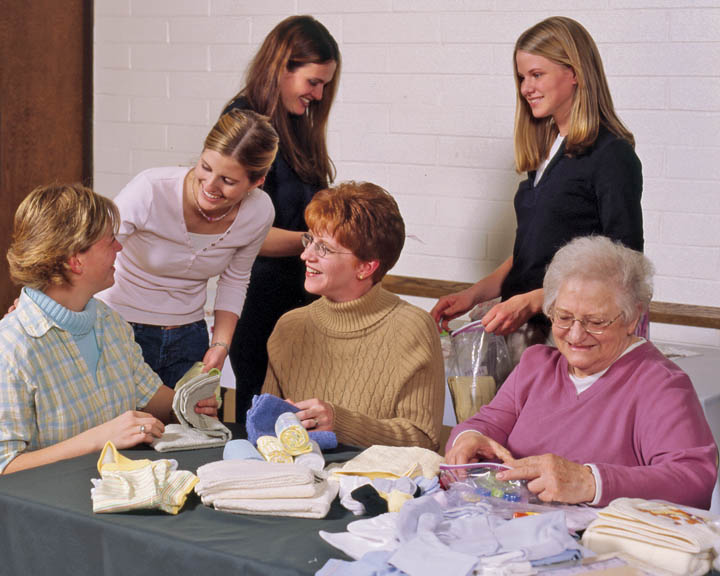I’ve always loved people who say what they mean and mean what they say. Beating around the bush doesn’t cut it with me. Cookie cutter people don’t exist, as we are all different, yet some people spend their whole lives trying to be part of the crowd—to fit into the popular notions of the day. Political correctness doesn’t cut it with me either.
We all make mistakes, so why not own them and repent? People who hide their mistakes and pretend to be perfect drive me crazy. Imagine my pure pleasure to hear Sister Sharon Eubank discuss these very things during the Women’s Session of LDS October 2017 General Conference! She advised us to be righteous, articulate, different, and distinct—all that while being happy.
Righteous
Being righteous doesn’t mean being perfect or never making mistakes. It means developing an inner connection with God, repenting of our sins and mistakes, and freely helping others. … Being articulate means to clearly express how you feel about something and why. … Each of us needs to be better at articulating the reasons for our faith. … Innovation and creation are spiritual gifts.
When we keep our covenants, it may make us different from others in our culture and society, but it gives us access to inspiration so we can think of different solutions, different approaches, different applications. We aren’t always going to fit in with the world, but being different in positive ways can be a lifeline to others who are struggling. … [B]e distinct.
Distinct means to be recognizably well defined. … The restored gospel is recognizably well defined. But we have to be distinct about how we follow it. … Being happy doesn’t mean to slap a plastic smile on your face no matter what is going on. But it does mean keeping the laws of God and building and lifting others (Sharon Eubank, First Counselor, Relief Society General Presidency, “Turn on Your Light,” Oct. 2017 General Conference).
When I first came back to Church after 20 years of inactivity, I was asked to teach a class of 10-year-old children in Primary (children’s Sunday School). I was horrified. What kind of an example could I be to these children? I had done everything their parents were trying to teach them not to do. As I hesitantly accepted the calling, I decided that the only way I could possibly teach these children was to lay my own life down as the bad example and explain the consequences of my actions.
Articulate
A year later, I was called as Primary president (responsible for the children 18 months to 12 years old). I spent another three years with my previously private life as an open book of “what not to do” examples. In the years since I’ve had to teach many classes to adults. I don’t know how to teach any other way. Between teaching those classes, and the writing I have done in the last few years, there isn’t much left unexposed of what was once my very private life.
 I’ve been articulate, and I’ve most assuredly been different and distinct. Being righteous is a constant battle, but as Sister Eubank explained, righteous doesn’t mean perfect, just constant repentance. I’m learning to repent daily. The older I get, the more I understand just how much I need to repent. I used to think there was a need to repent concerning the big things, but the little things only required that I try harder each day. I now understand that trying harder isn’t enough; true repentance is more than just trying harder.
I’ve been articulate, and I’ve most assuredly been different and distinct. Being righteous is a constant battle, but as Sister Eubank explained, righteous doesn’t mean perfect, just constant repentance. I’m learning to repent daily. The older I get, the more I understand just how much I need to repent. I used to think there was a need to repent concerning the big things, but the little things only required that I try harder each day. I now understand that trying harder isn’t enough; true repentance is more than just trying harder.
Sister Eubank reminded us of President Spencer W. Kimball’s prophecy about the role of women in the last days.
Finally, my dear sisters, may I suggest to you something that has not been said before or at least in quite this way. Much of the major growth that is coming to the Church in the last days will come because many of the good women of the world (in whom there is often such an inner sense of spirituality) will be drawn to the Church in large numbers. This will happen to the degree that the women of the Church reflect righteousness and articulateness in their lives and to the degree that the women of the Church are seen as distinct and different—in happy ways—from the women of the world.
Among the real heroines in the world who will come into the Church are women who are more concerned with being righteous than with being selfish. These real heroines have true humility, which places a higher value on integrity than on visibility. Remember, it is as wrong to do things just to be seen of women as it is to do things to be seen of men. Great women and men are always more anxious to serve than to have dominion.
Thus it will be that female exemplars of the Church will be a significant force in both the numerical and the spiritual growth of the Church in the last days (President Spencer W. Kimball (read by Sister Camilla E. Kimball), “The Role of Righteous Women,” Oct. 1979 General Conference).
Distinct
 I’ve spent several weeks thinking about President Kimball’s prophecy, as well as Sister Eubank’s enlightened remarks on the subject. There are some women I truly admire. They are the real heroines to which President Kimball referred. I never stopped to analyze why I admired them until now. Integrity, honor, humility, righteous, articulate, different, distinct, and happy are all words I could use to describe these good sisters.
I’ve spent several weeks thinking about President Kimball’s prophecy, as well as Sister Eubank’s enlightened remarks on the subject. There are some women I truly admire. They are the real heroines to which President Kimball referred. I never stopped to analyze why I admired them until now. Integrity, honor, humility, righteous, articulate, different, distinct, and happy are all words I could use to describe these good sisters.
Notice that all these are not just words, but character traits. Is good character even a thing anymore? It doesn’t seem like it sometimes—yet, I know these women. Obviously, they cared more about these characteristics than visibility. In a conversation with someone the other day, we decided that there is a lot of good left in the world, even if we don’t hear about it. I’m sure that is a direct result of righteous women quietly going about doing good without seeking visibility, the limelight, or reward.
One of the sisters I’ve described had a stroke a while back, which has affected her memory. She has told me several times that she wonders if she will remember the important things when she passes out of this life. I’ve assured her multiple times that all those things she learned will come to her memory easily when she dies. I wish I could make her understand that while knowledge of gospel principles and temple covenants is important, her character is what will count the most.
Integrity is her middle name. Not once did I ever see her shrink from truth or righteousness. She was the first to admit she was wrong—even when it hurt. And she was willing to have the hard conversations and stand up for what was right. She exemplified honor. There are some who may have thought she was blunt—“ but the guilty taketh the truth to be hard, for it cutteth them to the very center.” (1 Nephi 16:2)
My friend knew how to be articulate, different, and distinct in standing for truth and righteousness. Yes, that will count for a whole lot after this life—and her memory of the knowledge learned will return. I went to see her recently and was also very pleased that she has not lost her sense of humor. Her body and her mind may be giving out on her, but she is still happy even through it all. Apparently, happiness comes from righteousness. Who knew? Wink, wink.
About Tudie Rose
Tudie Rose is a mother of four and grandmother of ten in Sacramento, California. You can find her on Twitter as @TudieRose. She blogs as Tudie Rose at http://potrackrose.wordpress.com. She has written articles for Familius. You will find a Tudie Rose essay in Lessons from My Parents, Michele Robbins, Familius 2013, at http://www.familius.com/lessons-from-my-parents.
Twitter •







